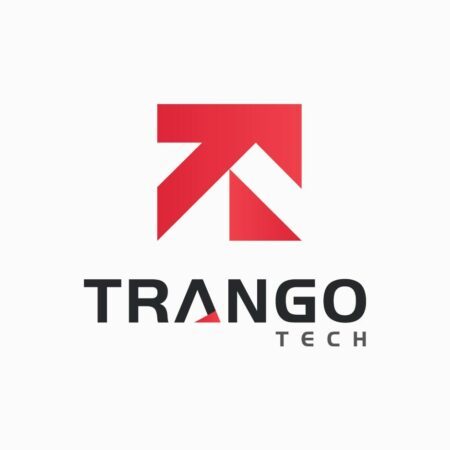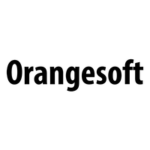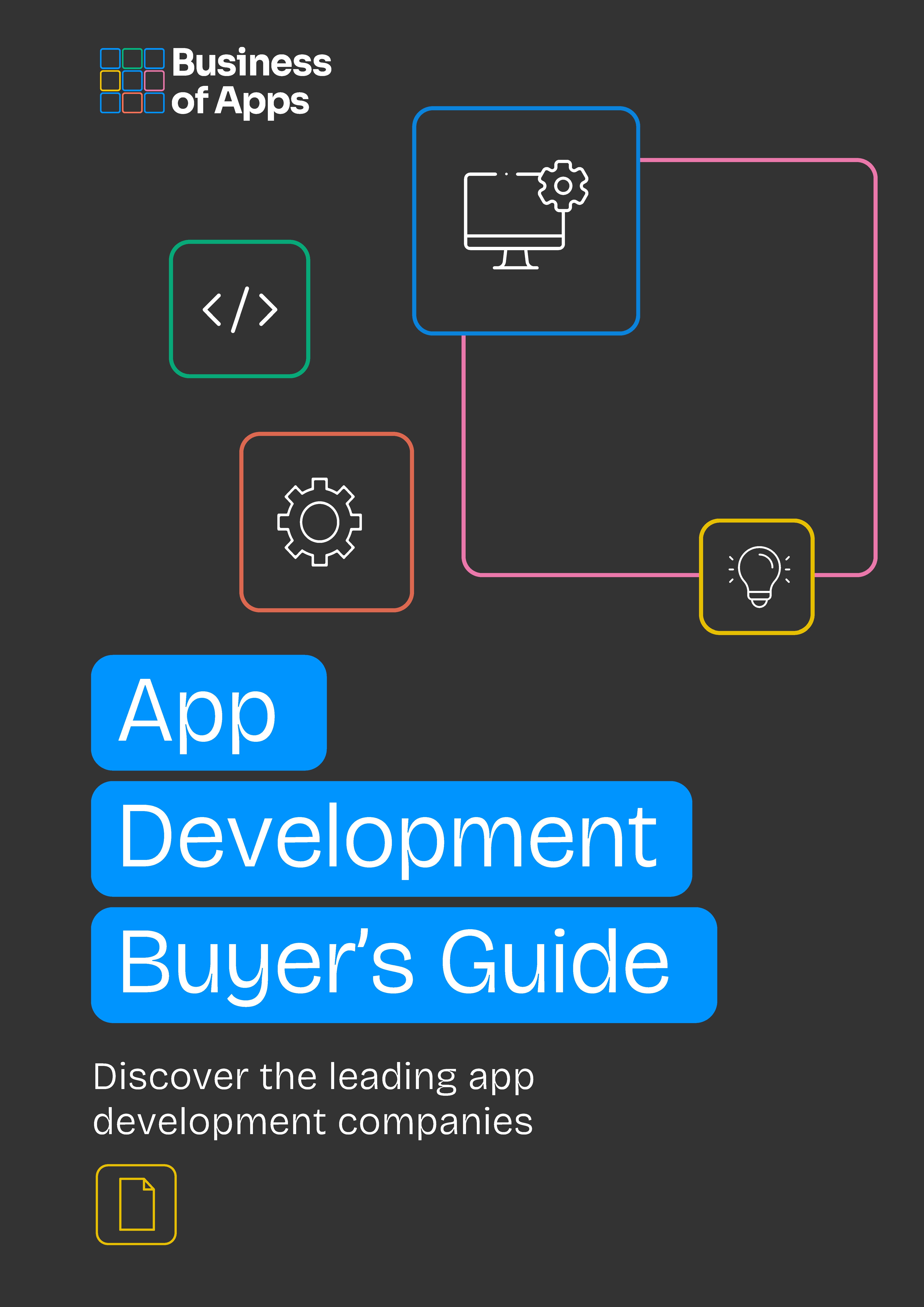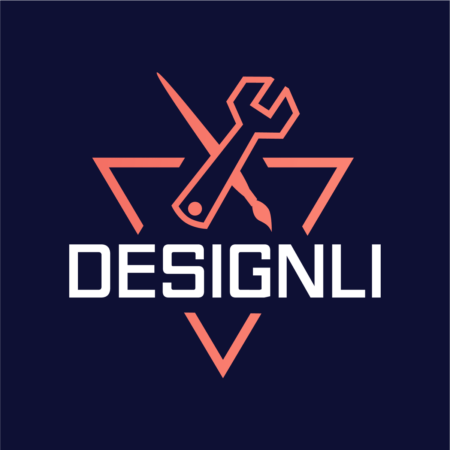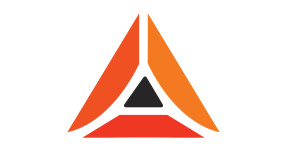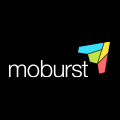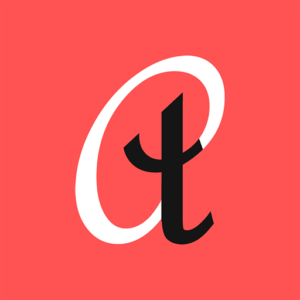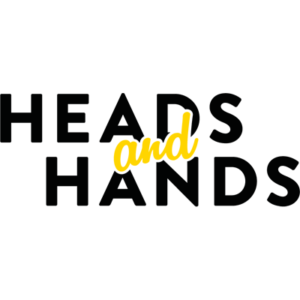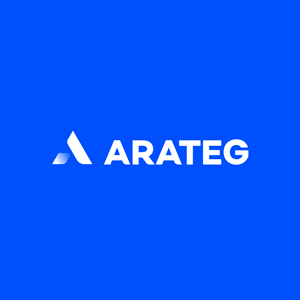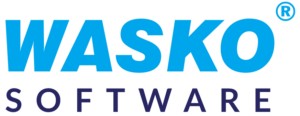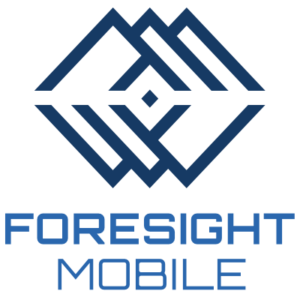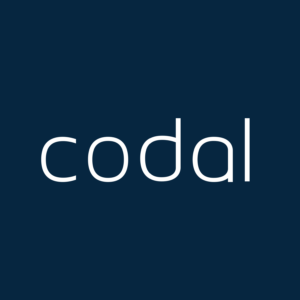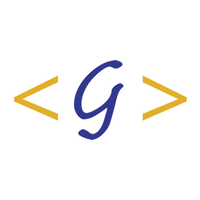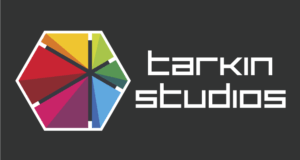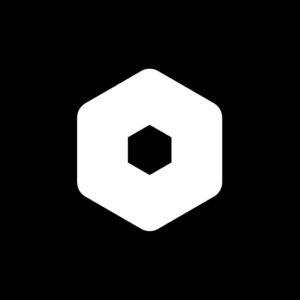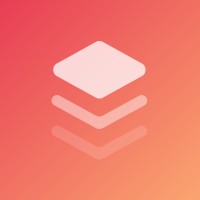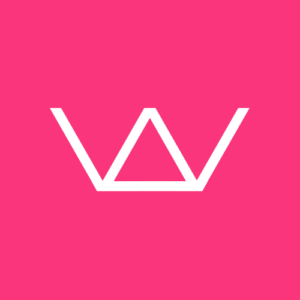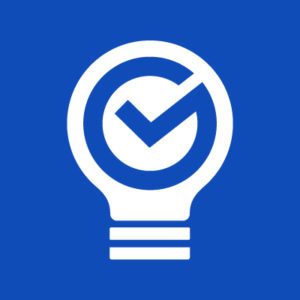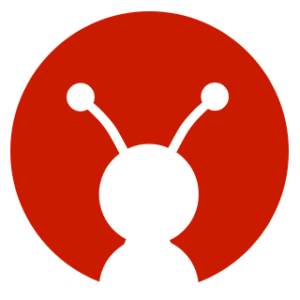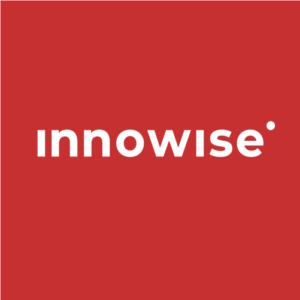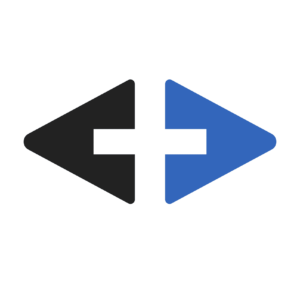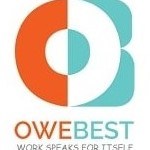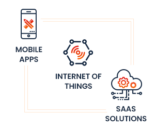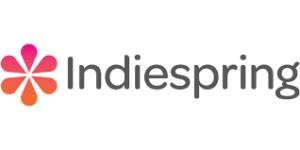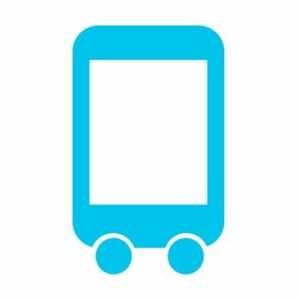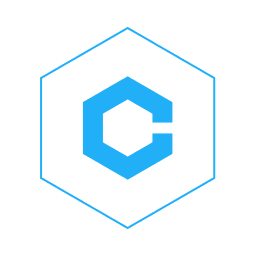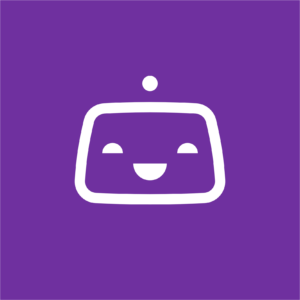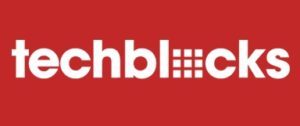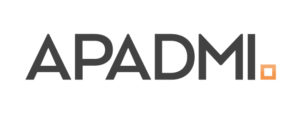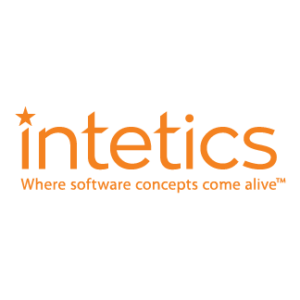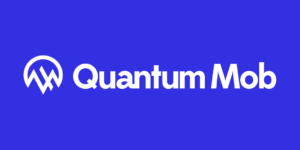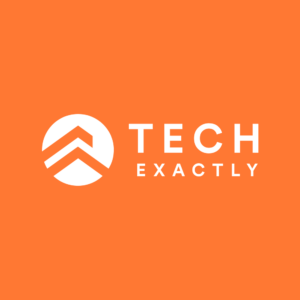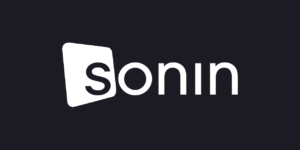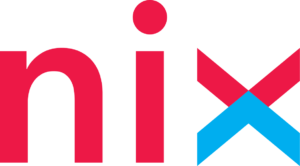This guide will cover the best healthcare app development services, how much it costs, top app development features, and how you stand to benefit from using healthcare app development companies.
Healthcare apps help to contribute to the well-being of people. From tracking activities to keeping up to date on a medical regimen, healthcare apps are here to stay.
Hospitals and medical institutes are now creating their own apps to help their patients keep healthy and are benefiting from being able to reach more people as a result. In fact, more than 90,000 new healthcare apps were introduced in 2020 alone.
Building and developing healthcare apps requires a number of must-have features to be implemented.
Expert healthcare app development 💯
Book A Complimentary Consultation TodayNMG specialises in healthcare software. From medical record management to remote patient monitoring, we craft HIPAA-compliant apps tailored to your needs.
First and foremost, the app needs to be easy to use. Secondly, patients need an app that is able to save them time, from booking appointments to an online diagnosis; the key is ease of use and a high level of functionality.
Providing actionable information is important, too, as well as facilitating easy communication with medical professionals.
Don’t know where to begin? We’ll cover everything you need to know about healthcare app development.
What is a healthcare app?
A healthcare app is most commonly an app that diagnoses, tracks, or treats disease.
An important distinction is that while many apps fall under the health category, not all are medical healthcare apps. An app that teaches you how to do Pilates may help you achieve your fitness goals, but it doesn’t cover your physician-led care routine–those are fitness healthcare apps.
Medical healthcare apps are apps you can use in conjunction with your health regimen and offer health tracking and reporting, medical reminders, and communication with a provider; some may even serve as a platform for virtual health visits.
Users can download healthcare apps on their smartphones or tablets.
App Development Buyer's Guide
Download our App Development Buyer’s Guide to get a full list of the best service providers on the market to choose from. You will also learn about types of app developers, different app development platforms, app developer locations, app development costs, how to select the right one for your business, as well as the questions to ask any of those companies you will be evaluating.
The best healthcare apps have strong reputations that get backed up by thousands of positive reviews. They facilitate live consultations with doctors, dentists, and psychologists and allow you to manage your prescriptions.
The best healthcare app developers
Healthcare app developers are companies (or professionals) who specialize in creating apps tailored to the healthcare industry.
These mobile apps are designed to improve the delivery of healthcare services, streamline medical processes, and provide patients with easy access to health information.
We’ve listed the best healthcare app developers below.
1. NMG Technologies

NMG Technologies is a healthcare app development company that offers a wide range of services, including web and mobile app development, eCommerce solutions, custom software development, and digital marketing.
NMG developed the healthcare-focused features and security of SynApp, a mobile app that works to keep medical workers safe from severe HIPAA penalties. To help protect users from HIPAA violations, end-to-end encryption and two-layered access when handling PHI were implemented. Medical workers can now communicate within (and outside) their facilities through chat, audio, and video calls.
Overview
NMG Technologies serves a global client base that includes startups, SMEs, and large enterprises. The company strongly emphasizes quality, timely delivery, and customer satisfaction.
Their client base spans various industries, including healthcare, finance, retail, and education.
Services
NMG Technologies provides its customers with the following services:
- Custom healthcare app development using new and leading tools
- Development of native and cross-platform healthcare mobile apps for iOS and Android
- Focuses on creating user-friendly, scalable healthcare apps tailored to the client’s specific needs
2. Orangesoft

Orangesoft is a mobile app and web development company that creates custom software solutions for businesses. The company serves various industries, including healthcare, helping clients build high-quality digital products.
Orangesoft created a HIPAA and FDA-compliant MVP for a virtual hospital platform that enables patients to get high-quality specialist support 24/7, eliminating the need for in-person visits.
With real-time access to medical history and device data, healthcare specialists can provide advice to their remote patients without spending (physical) resources on care delivery. The solution is being distributed to empower individuals to take charge of their health journeys and democratize access to care.
Overview
Orangesoft was founded in 2011 by Dmitry Zolotukhin and Alexander Vinogradov. They established the company to provide custom software solutions, focusing on healthcare mobile app development as well as web development.
Orangesoft has worked with several key clients, including Yandex, Kaspersky Lab, Revolut, and OZON.
Services
Orangesoft provides its customers with the following services:
- Real-time syncing and account linking for healthcare mobile apps
- Using frameworks like React Native and Flutter to develop health apps that work on both iOS and Android
- Building robust back-end systems with Node.js, Python, Ruby on Rails, and other server-side tech
3. ELEKS

ELEKS offers a wide range of services to help businesses innovate, optimize operations, and drive digital growth across industries such as finance, healthcare, retail, and logistics.
US-based healthcare solutions provider Fleming-AOD needed to upgrade and enhance its patient assessment instrument (known as PAI) in line with new compliance legislation.
The ELEKS team suggested a clever tech solution that would offer remote, centralized updates and enable cost-effective maintenance and optimal user-friendliness. Overall, Fleming-AOD had a market-ready product developed in four weeks instead of four months–saving up to 80% of the development cost and making PAI one of the first in the industry to meet the new regulations.
Overview
ELEKS was founded in 1991 by Oleksiy Skrypnyk. The company started as a small software development firm in Ukraine. Since then, it has grown into a global tech solutions provider.
ELEKS has worked with prominent clients across various industries, including Hewlett-Packard (HP), Deutsche Bank, The World Health Organization (WHO), and Yelp.
Services
ELEKS provides its customers with the following services:
- Analyzes target audiences, competitors, and industry trends to shape healthcare app features and functionalities
- Creates visually appealing and intuitive healthcare interfaces that enhance user engagement
- Ascertains key business goals and then develops a strategic plan for healthcare mobile apps
4. Designli

Designli is a software development firm that offers a comprehensive range of services, including UX/UI design, healthcare mobile app development, web app and cross-platform development. Their approach focuses on delivering high-quality, user-friendly solutions tailored to meet the specific needs of their clients.
Designli developed AskIris, a healthcare mobile app that allows healthcare professionals to search by voice or text to find what they need immediately. It can also provide low-stock alerts so supply room administrators can order more, as well as enable medical supply admin to manage inventory via CSV with simple uploads and imports instead of manual processes.
AskIris was built with AngularJS, NodeJS and Flutter, and cross-platform app development allows it to function on Android, iPhone, Apple Watch, and even Zebra devices.
Overview
Designli was founded in 2013 by Joshua Tucker and Keith Shields. The company is based in Greenville, South Carolina, and focuses on providing design and development services, particularly for custom healthcare mobile and web apps.
Services
Designli provides its customers with the following services:
- Helps clients define their product goals, target users, and market strategies
- Builds healthcare apps that work across multiple platforms, ensuring broad accessibility and functionality
- Offers professional design services to craft intuitive and visually appealing user interfaces
5. App Maisters

App Maisters specializes in healthcare mobile app development and digital solutions. The company is able to develop health apps that meet the specific needs of larger organizations.
The App Maisters team helped develop an innovative healthcare solution centred on a UWP-based Windows Tablet app, with primary access via the Windows Surface Go 2 platform.
The collaboration resulted in the successful transformation of a concept into a polished, user-centric healthcare mobile app. The app interfaces with a mechanical circulatory support system—in short, an artificial heart pump—and is customized to cater to the unique needs of patients with heart failure who have found traditional medications inadequate.
Overview
App Maisters was founded in 2017 by Fahim Iqbal, the current CEO. Under Iqbal’s leadership, App Maisters has grown and established itself in the app development industry, helping companies across various sectors build innovative mobile apps.
App Maisters has worked with a variety of clients, including brands such as PepsiCo, ExxonMobil, and Shell.
Services
App Maisters provides its customers with the following services:
- Develops healthcare app prototypes to visualize the mobile app before full-scale development begins
- Crafts intuitive, attractive, and functional healthcare app designs
- Builds health apps that work across multiple platforms (iOS and Android) using frameworks such as Flutter, React Native, and Xamarin
6. Trango Tech

Trango Tech is a tech service and healthcare app development company aimed at helping businesses enhance their digital presence, streamline operations, and innovate their product offerings.
Shifaam is a telemedicine platform with over 2500 doctors that’s powered by Trango Tech. Trango provides access to the critical machine learning, AI and cloud tech behind the platform.
Shifaam’s overall goal is to enable patients to stay in touch with their doctors. With the help of virtual web solutions, patients are empowered to choose from multiple specialists and connect from anywhere at any time. Currently, Shifaam ranks amongst the top telemedicine platforms serving patients across Pakistan.
Overview
Trango Tech was founded in 2017. The company was established with the goal of providing innovative tech solutions, particularly in the areas of healthcare mobile app development, web development, and IT consulting.
Since its founding, Trango Tech has worked with clients across various industries to help them build custom software solutions that meet their business needs.
Services
Trango Tech provides its customers with the following services:
- Provides customized healthcare platforms
- Offers cloud-based solutions for data storage, scalability, and infrastructure management
- Develops healthcare software that enhances enterprise-level systems and helps with automation, integration, and data management
7. Light IT Global

Light IT Global is a healthcare app development company that delivers innovative web and mobile solutions for startups and enterprises. With over 18 years of experience, they have completed over 500 custom projects for clients worldwide, including in Europe, the United States, and Japan.
Light IT Global collaborated with Pfizer for over 17 months, and the newly introduced healthcare software they created proved to be extremely efficient. The results were an automation rate that is now three times higher than before their team took over. This resulted in a massive burden being removed from Pfizer’s Global Digital Operations Department and dramatically increased productivity.
The time required to complete most tasks via the CMDB was cut from 8 hours to 30 min, and more than 6000 environments were taken under control. The system proved helpful even during the COVID-19 outbreak itself.
Overview
Light IT Global was founded in 2006 in Ukraine. The company began as a small team of three individuals engaged in reconstructing local historic landmarks.
Over time, it transitioned into a software engineering firm, expanding its services to include web and mobile development, IT consulting, and business digital transformation.
Today, Light IT Global employs over 100 professionals and has completed over 500 custom projects for clients worldwide.
Services
Light IT Global provides its customers with the following services:
- Crafting intuitive and visually appealing health app designs that enhance the user experience and boost engagement
- Designing and building full healthcare mobile apps for iOS and Android
- Developing robust, secure, and scalable healthcare platforms
Types of healthcare apps
Examples of healthcare apps, across both mobile and web apps, include the following:
- Fitness and exercise apps
- Medical record apps
- Remote patient monitoring (RPM) apps
- Prescription price comparison apps
- Pharmacy delivery apps
- Symptom checking apps
- Medical reference and database apps
Healthcare app developer example
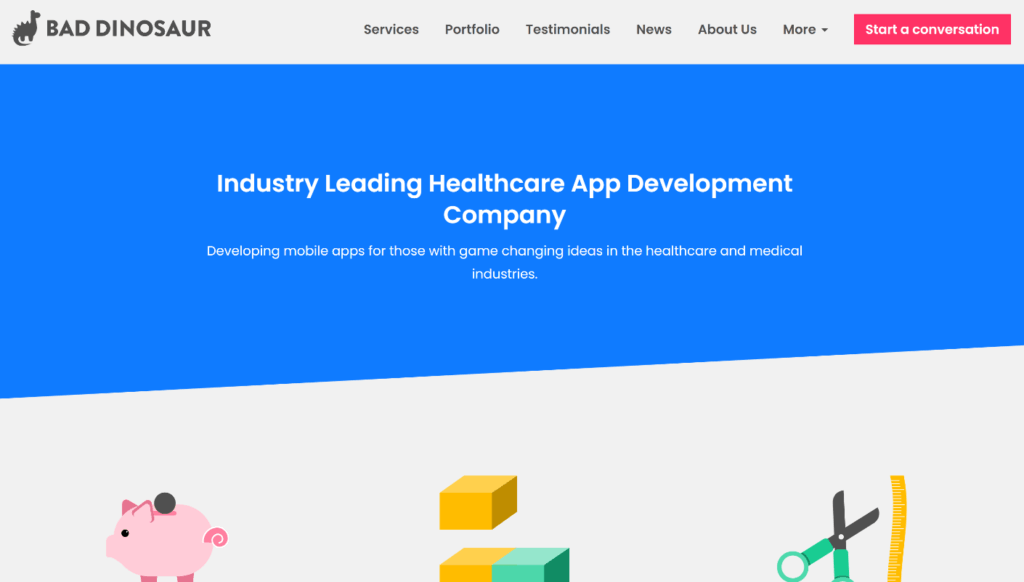
Source: Bad Dinosaur
Remote monitoring apps enable patients to remain at home, and practitioners can keep track of their patient’s heart rates, oxygen levels, and blood glucose readings without the need for office visits.
Clinical reference apps offer digital access to the ICD-9 and ICD-10, E&M coding, and other specialized reference materials in the US, ensuring healthcare providers can avoid carrying around heavy reference guides.
Think carefully about which category your finished healthcare app would fall under before setting off.
Why should I develop a healthcare app?
There’s enormous potential in the space, for one. Mobile users love healthcare apps and frequently prefer their doctors to use them over more traditional methods due to the ease of use. Pandemic-driven lockdowns have only accelerated this trend.
On the provider side, the same is also true. The use of medical apps has become widespread. For example, 70% of medical school students reported using at least one medical app regularly, with 50% using their favourite app daily.
Healthcare apps help a wide range of users, including doctors, patients, nurses, prescription vendors, administrators, and lab technicians.
For doctors, the apps help with patient tracking and monitoring, appointment scheduling, and staff management. While patients can book appointments, chat with their doctors, and get recommendations when required.
The use of healthcare apps is growing, too: there are 45,478 healthcare apps on the App Store and around 43,285 applications on the Google Play Store.
Healthcare app developer example
 Source: Dogtown Media
Source: Dogtown Media
Additional benefits for users include faster loading times than those experienced when logging in via computers, better UIs and more convenience wherever they happen to be at that specific moment. The key value that a healthcare app offers is medical knowledge that’s painless to obtain.
Health apps are used by the general public and focus on medical information or prescriptions as well as track users’ daily medical data. Development costs are less when compared to standard medical apps for healthcare professionals.
In a nutshell, whether you target patients or healthcare professionals, the audience is highly engaged, and the demand is growing every year.
What is the healthcare app development process?
You need to develop the best healthcare app possible, one that loads quickly, runs smoothly, has tracking and monitoring features for patients and medical professionals alike, and isn’t plagued by glitches.
Building a great healthcare app is about following a well-defined process that ensures nothing gets missed in development, from identifying a good healthcare idea to testing and maintenance. Let’s take a look.
1. Find your idea
The most important step is finding a good idea for your mobile healthcare app. Your app development must be oriented by considering a healthcare problem and applying its solution.
Idea validation determines a mobile app’s viability and interoperability; you need to start by organizing your internal resources.
From there, identify the market need before using any healthcare mobile app development services.
Once you have a good idea, you must check its viability by doing the following:
- Conducting market research of customers
- Developing your healthcare app idea
- Testing
- Validation
2. Market research and customer feedback
You need to conduct market research and gather crucial customer feedback.
For instance, if you were validating an idea for a mobile health solution that caters to people suffering from a heart condition, you must be able to help them find doctors, medicines, vendors, and information. They would need to be able to maintain their records via the app as well.
Start by conducting healthcare industry and app market research at both ends. In this scenario, you would find out the following:
- The number of patients with a heart condition in your target region
- The number of existing similar apps (competitors)
You must also get feedback from existing entrepreneurs; skilled entrepreneurs will help you develop a good mindset for building a medical app.
3. Validating a business hypothesis
The next step in the process is customer acquisition planning. By now, you have a product, and it’s achievable.
You have also researched your competitors, and due to business hypotheses testing, you have built a more suitable product for doing so. However, how will your customer know it’s a better product?
Simple: you can determine this by conducting customer interviews.
Inform customers by placing paid ads and creating UX designs for landing pages. Remember that promotion and marketing of your startup is an innate part of developing a mobile healthcare app.
4. Estimate the cost
You need to consider many factors for determining the cost of your healthcare solution, from the app’s must-have features to ongoing upkeep costs.
It’s best to estimate before starting the app development process–you can do this by preparing a budget and detailed timelines.
5. Build an MVP
When you have enough data to support your idea about mHealth (mobile health) app creation, you need to think about the development of the healthcare app MVP (minimum viable product).
It’s time to think about finding a development team of healthcare app developers who excel in the world of healthcare and can do this for you.
With the development of a healthcare mobile app MVP, you’ll be able to test out your mobile app in its most basic form.
If required, look for funding for medical app development through bootstrapping or acquiring investors. Remember that a healthcare mobile app MVP is a fully functioning solution and is one of the primary steps needed to minimise risk.
6. Design the app
Any healthcare app development concept must incorporate design elements such as UI, interface, screen rotations, button placements and more.
Great healthcare app designs hook in users immediately, so you need to get this right straight away. A good design is critical and will make or break your app.
Be sure to hire a team of developers or work with a reputable app healthcare development company with the appropriate expertise. You need to be able to build a competent app without excessive fuss.
Healthcare app developer example
 Source: MindSea
Source: MindSea
7. Deployment
Deployment is the stage where you must ready your marketing materials before sending your app out into the world. This step is usually achieved via social media but includes video ads to get the word out as well.
The healthcare app must stay updated, and you need to be ready to deal with customer problems. Focus on the user experience first and foremost, as this cuts down problems before they appear.
8. Upgrading and improving
Your mobile healthcare app is always in development from a long-term point of view–a smart perspective, as you aren’t finished after its launch.
You need to be sure that you keep improving and upgrading the healthcare app as feedback comes in, including tackling new bugs and other user problems.
The improvement of processes and products should be made by adopting new tech where possible. Keep your focus on marketing and check which features are missing too.
Healthcare app development best practices and features
Here are some of the critical aspects to consider when developing a healthcare app, including best practices as well as essential and advanced features.
Easy registration and login
In-app registration and user logins let the users input their information so that wait times for the appointment get cut down. Logging into your healthcare app needs to be flawless.
Registration can help patients create their profiles on the app and input any information they need. Any protected health information (known as PHI) your app collects must stay safeguarded against malevolent forces to comply with HIPAA regulations.
Appointment scheduling
Appointment scheduling is one of the healthcare app’s core features and functionalities that patients expect to see. Having appointment scheduling on the go through a healthcare app benefits both patients and healthcare professionals.
Your app must display available slots for the appointment and allow users to book one that’s convenient for them. Once the doctor or admin approves the appointment, confirmation gets sent out to users through the mobile app.
Healthcare app developer example
 Source: Netguru
Source: Netguru
Doctor profile lookup
Your healthcare app needs to enable patients to choose the doctor of their preference. A doctor profile lookup section is a critical feature if you offer virtual healthcare appointments. Apps can find doctors within a city, check for pharmacies, or even find a list of hospitals and compare services.
With this feature, patients can look up their credentials and choose the doctor they like based on their experience. You can add additional features such as geolocation that can help connect with doctors nearby and more.
Essential features
Your healthcare app will need to offer a lineup of essential features that the app can’t function without (and that users expect to see to take you seriously).
The MVP is the minimum standard to showcase your product to your target audience, and the features must fulfil the most critical functions of medical and fitness apps.
These are the essential features your app needs to have:
1. Reminders and notifications
2. Symptom checker
3. In-app chat
4. Patient community
5. HIPAA compliance
6. Remote diagnosis features
7. Integration with medical devices
8. Health dashboard
9. Prescription tracking
10. Access to medical records
Focus on healthcare app features that provide the greatest value to your customers at all times. Gather feedback, let users tell you what features make sense to them, and then implement the changes when possible.
Healthcare app developer example
 Source: Light IT
Source: Light IT
Advanced features
Advanced features are optional, but they allow your medical app to offer more value to users. Advanced app features include the following:
1. Wearable device integration
2. Cloud support
3. ML (machine learning) integration
4. EHR integration
5. IoT functionality
6. Multi-device support
7. Live video consultation
8. Use of blockchain technology
9. AI support
10. Health activity tracking
Of course, the more advanced features you add, the higher the cost of the healthcare app’s development. Keep this in mind when deciding your overall budget.
How much does it cost to develop a healthcare mobile app?
Development costs of healthcare apps vary. Below are the average estimates per app complexity:
- Approximately $45,000-$80,000 for a mHealth app for a single platform.
- Approximately $80,000-$120,000 for more complex apps used across multiple platforms.
- Approximately $425,000 for a fully-fledged app for multiple platforms. This includes the pre-build, development, and maintenance phases.
Companies in Eastern Europe charge around $70-$150 per hour. On the other hand, developers in the USA charge over $80-$250 per hour, as you might expect.
You’ll also need to factor in the costs associated with being HIPAA compliant, which are typically around $10k and above.
On average, healthcare app development will cost you between $45,000-$150,000, but this depends on the app’s complexity. It’s worth contacting a healthcare app development company for an estimate first.
How can I benefit from healthcare app development services?
Partnering with healthcare app creation companies allows you to create customer-friendly apps that enable users to track their daily medical data and schedule appointments when needed.
These developers let you take advantage of the significant opportunity available while keeping things as stress-free as possible.
Healthcare app developers can build highly-scalable apps, whether they’re fitness apps or dedicated medical apps for practitioners. These development companies create stunning apps that use the latest tech and trends while meeting user expectations.
Healthcare app developer example
 Source: Tech Exactly
Source: Tech Exactly
Some of the key benefits of healthcare app development companies include the following:
- Reduced development and maintenance costs — Healthcare apps get designed using different frameworks, which allow developers to reuse the code for many different medical apps.
- Improved functionality and usability — App development companies provide excellent functionality and usability with top-notch healthcare features, such as remote diagnosis, as standard.
- Flexible plans — Custom plans designed to fit all needs, big or small, and typically come with superior scalability for your medical and fitness apps.
- Better security — Healthcare apps get built with increased security for patients and practitioners using the latest encryption technology.
- Compliance and data management — Better data management solutions that protect patient data and help you stay compliant.
- Secure and fast communication — Healthcare apps that can help you reach patients anytime with messages and live video consultations.
If you’re planning to develop a healthcare app, getting a free quote from mobile app development experts is usually a good idea–this is especially true if you’re a non-developer or a beginner.
Get started with the best healthcare app developers
To recap, the most critical reasons for having a healthcare app are the following:
- It can allow for easier communication between patients and practitioners, wherever they are
- Patients can keep up to date on prescriptions more easily
- You can maintain online medical records and stay HIPAA-compliant
- Booking a visit to a doctor can be completed through mobile apps on the go
- The use of medical apps has become frequent and widespread for both patients and practitioners
- You can provide directions to clinics and hospitals via your healthcare app
There are a number of app development companies that take on healthcare app development projects and have app developers with experience specifically catered to these apps. Here we’ve put together for you a list of the best.



